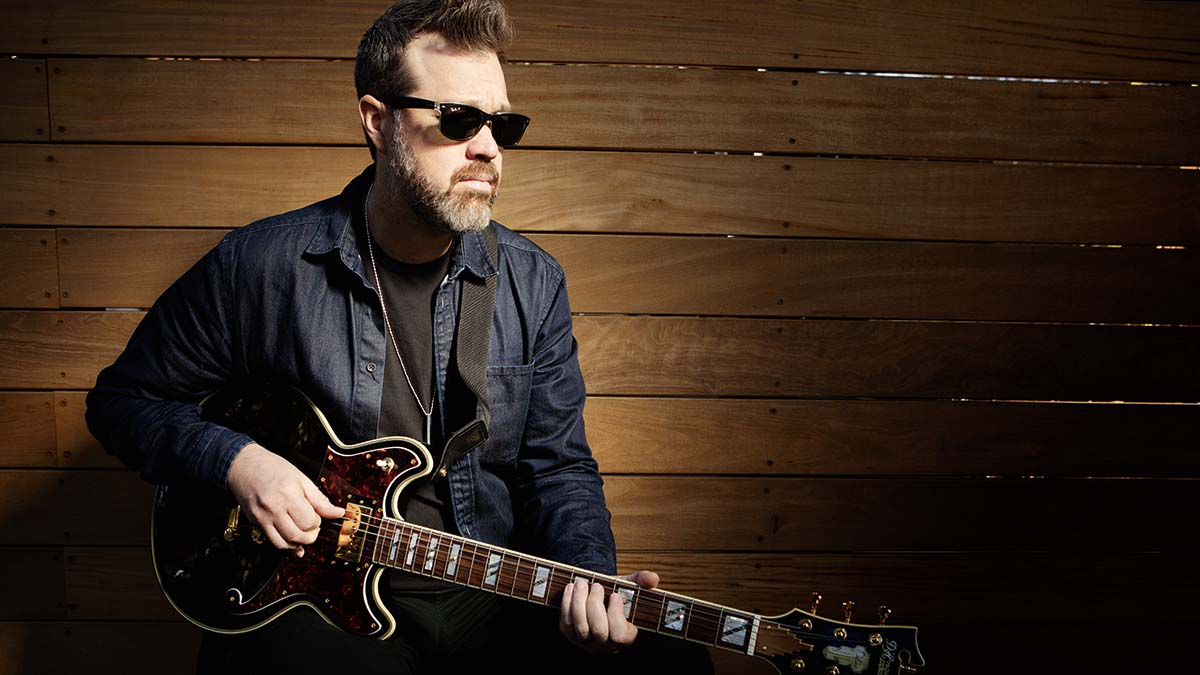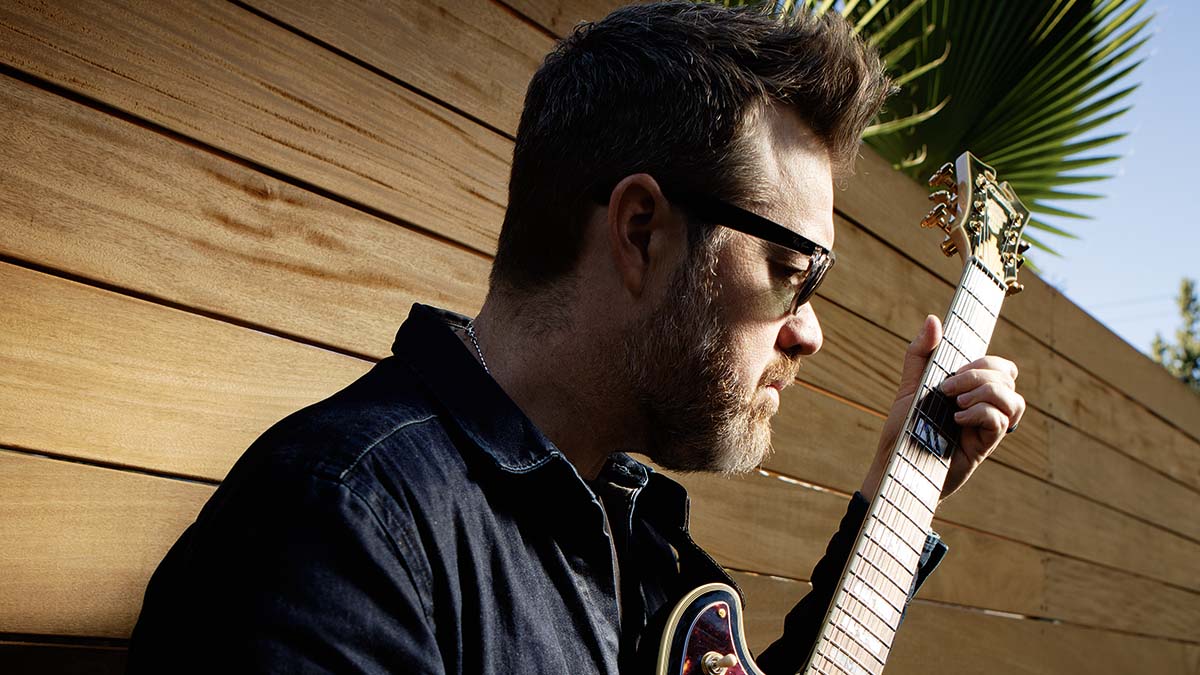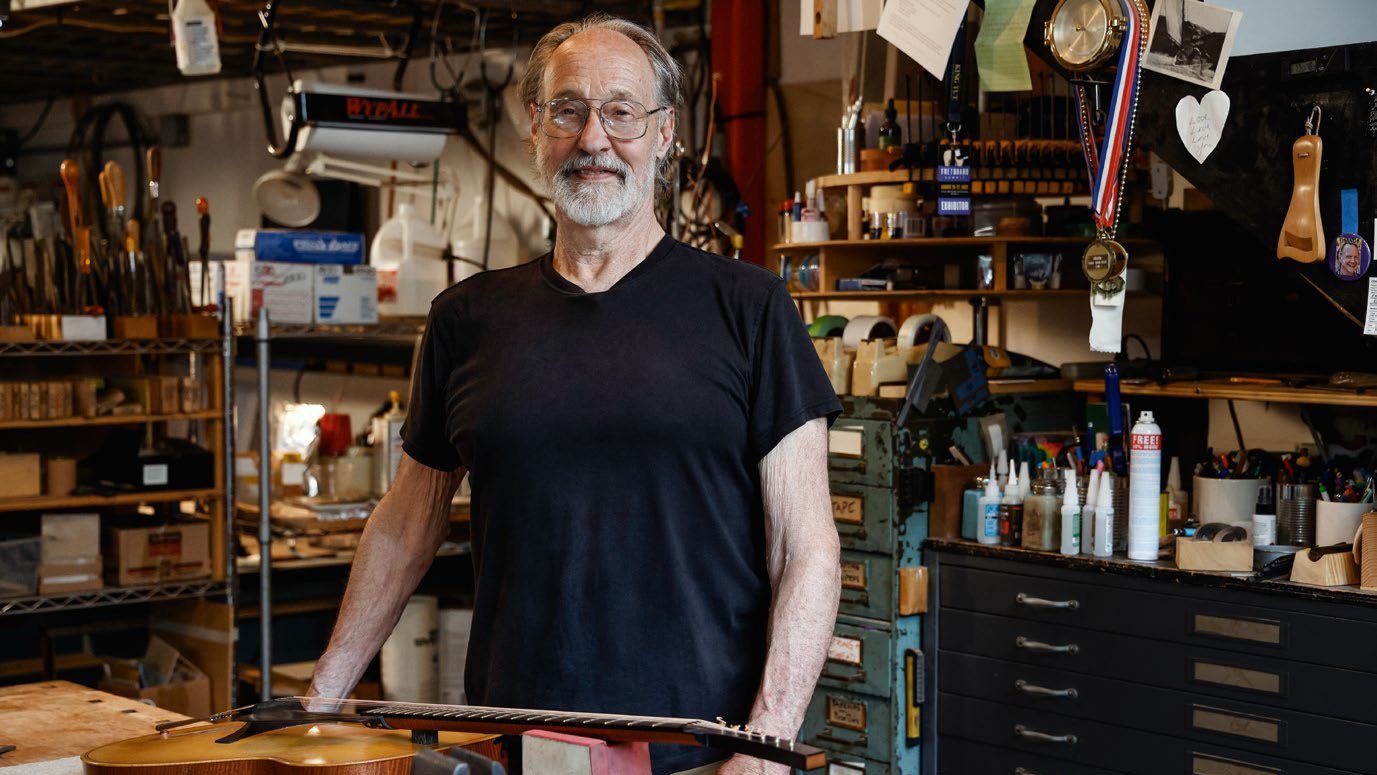Eric Krasno: “John Mayer sent me one of his Silver Sky guitars and I loved it. It got me back into the single-coil ‘Strat’ world”
LA’s Eric Krasno has both fretboard fire and a prolific pen, making him one of the most exciting R&B-vibed guitarists working today

If you peruse the artists signed to the Mascot Label Group, it reads like a list of the sharpest guitar players around: from Vai to Robben Ford, the level of musicianship is incredible. But one artist on the roster seemed a little more intriguing.
Los Angeles resident Eric Krasno is one of those interesting musicians who is happy to sit on a tasteful, minimal groove all through one song only to burn like a latter-day Wes Montgomery on the next. Blending elements of Herbie Hancock and Curtis Mayfield in his writing with chops worthy of Grant Green, Krasno really is a subtle gem of a musician.
Krasno’s broad-based approach may come from his background as a producer – and he has produced some of the biggest names in music, from rapper 50 Cent to Derek Trucks & Susan Tedeschi to soul legend Aaron Neville. And it also may be why his own records are studies in warm, understated funk with great-sounding arrangements.
A veteran of the bands Lettuce and Soulive, he’s now an established solo artist whose in-the-pocket new album, Always, walks in the footsteps of The Meters and Shuggie Otis. Intrigued, we swung by his home in Pasadena to find out more about this soulful, multi-faceted player.
What inspired you to pick up a guitar in the first place?
“My older brother was playing music – he’s almost six years older – and my grandfather was also a musician, and my dad, not professionally, but he played a lot of music, so it was in my house. When my brother started jamming with his friends in our basement, it was just something I wanted to be a part of.
“I had this record player that you could actually plug into, it had an input on it, so I could play along with records. My brother would let me borrow his guitar and I would play along with records and try to get good enough to the point where I could go jam with his friends.
All the latest guitar news, interviews, lessons, reviews, deals and more, direct to your inbox!
“Some of those early Led Zeppelin records just blew my mind. My dad loved The Rolling Stones and The Beatles, and Van Halen was popular at the time, but Led Zeppelin just felt like it was mine. I loved my dad’s music that he played, loved my brother’s, but when I found Led Zeppelin, it was like me. Then guys like Jimi Hendrix and Stevie Ray Vaughan blew my mind – and that was when I kind of took the dive.”
Your influences have a very bluesy foundation. With the music you’re playing now, your guitar style is a little more funky. What led you that way?
“There were different points where I took different exits off the highway into different realms. It might have been around the same time I discovered James Brown, and the stuff they were doing blew my mind, too, that rhythm stuff. And The Meters, Leo Nocentelli, and the rhythm players that were doing such unique, interesting stuff with the guitar that was much more percussive.
I was also really into Stevie Wonder and that was rooted in my dad playing Ray Charles and Stevie Wonder when I was a kid
“I was really into the Headhunters era of Herbie Hancock, Wah Wah Watson, and all those records. Compositionally, how he made funk music, but it was with jazz chord changes in there, and it was a lot of improvising and psychedelic elements.
“Then when we started the band Lettuce, the biggest influence really was that Herbie Hancock ’70s era, and Tower Of Power. We were really into hip-hop. I was into Run‑DMC back in the day, and the Beastie Boys. So that’s when all of that started feeding into it.
“I was also really into Stevie Wonder and that was rooted in my dad playing Ray Charles and Stevie Wonder when I was a kid. I got really into the ’70s era of Stevie Wonder, Music Of My Mind and Fulfillingness’ First Finale, all those records. All of it seeped in as I got older and discovered more and more records.”
Unlike many guitarists, you’ve done a lot of high-level production work in your career. How did you get into that world?
“When I was in college, I started to produce. I didn’t even know that I was doing it, but I’ve always been interested in producing records, since back in the day, sitting with my dad’s record collection and looking through the liner notes and wondering what each role was. I learned engineering just by plugging things in and figuring things out from the early days of my four-track.
“When Soulive got signed and we got to work with all these amazing engineers and producers, I was always studying what they were doing. Then, on the side, I was producing for other singers, and some of those things got pretty successful. Before I even really knew what I was doing, I was getting jobs producing, and it’s always been a sidebar to my career as an artist. It’s often times been hard to juggle the two, or really focus on producing, because I’ve always had bands and tours going on. But it’s something I’m very passionate about nonetheless.”
You’ve worked with a pretty diverse set of artists over the years...
“Yeah, it’s been all over the map. I produced Aaron Neville’s record a few years ago. I produced for 50 Cent. A lot of hip-hop records, especially during that era. Then there was Norah Jones. I’ve also worked with members of the Grateful Dead, I’ve worked with Dave Matthews…”
How big a part does your guitar playing play when you’re producing?
“It’s always different. If I’m doing a hip-hop session, it may not be there. I produced a group called The London Souls, where I don’t play guitar on the record, but I play bass. With Derek Trucks and Susan Tedeschi, I’ll play on some things.
“There’s other times, like Andy Frasco – I just produced his record – and I’m playing guitar on everything, and bass, and it’s more prominent. It’s different every time. Being a producer, it’s whatever’s needed in that moment.”
Your latest record, Always, has a really distinctive sound, taut and sparse yet groovy. How did you arrive at that?
“During the pandemic, when it first hit, I met a guy online, Otis McDonald is his producer/artist name, and we met through a mutual friend – Will Blades, the keyboardist in my band. He was like, ‘Oh, you got to work with this guy. He’s amazing,’ and we met via Instagram.
When you make a record, you can’t go from trap music to psychedelic rock. If there’s a way to drop all those influences in and create a unique sound, that is the magic
“He was like, ‘Hey, I’m doing this compilation project for charity. Wanted to see if you might want to do a song.’ At that time, I was just recording some demos of stuff here in my studio, I was messing around with this Bob Dylan song, The Man In Me, and I played acoustic and sang it.
“I sent it to him and he was like, ‘Oh man, let me add some stuff to this.’ So he produced it via satellite, added drums, bass, keys, background vocals. It was so stylistically right where I’m at. I was like, ‘Hey, man, I have a bunch of other songs sitting around.’
“We did pretty much the whole record like that. We were both sitting in our studio and it really sounds live, but the record, it’s [primarily] me and him. He’s a great drummer and keyboard player, and a great engineer and great mixer.”
When it came to the guitars, how did you approach the songs?
“John Mayer sent me one of his Silver Sky guitars and I loved it. It kind of got me back into the single-coil, like ‘Strat’ world, and a lot of the ‘using the fuzz pedal’ on stuff. That was the cool sound I used throughout the record. There’s some acoustic guitar on there, but mostly I used either a Strat or the Silver Sky.
“I just started developing this new guitar with D’Angelico, so that’s on the last couple of songs, which is also a single-coil vibe. I think I used my Ibanez model on the song called Hold Tight, but primarily I was in the Strat world.”
Being on the road and singing every night, that really informed how I wanted to write songs for me. Just even physically – where does my voice work? Where does it fit?
What were your go-to guitar amps?
“I was actually using a Supro Statesman head and this [Universal Audio] Ox. I used a Super Reverb with the Ox as well, so I went between those two. The Ox is an attenuator, but it also has a digital thing where it’s a speaker emulator. I had been mic’ing the amps [previously], and then just out of convenience was using [the Ox]. I loved the tones I was getting, even more than mic’ing the amp.”
Are there any go-to overdrive and distortion pedals that shape your sound on the record?
“I use an [Analog Man] King Of Tone all the time and an MXR Super Badass Variac Fuzz. I have a lot of fuzz pedals, but I just became obsessed with this one. They sent me that right around the same time Mayer sent me that red Silver Sky – and when I plugged those in together, it was like a magic combination. It has this Variac function that changes the voltage or emulates the voltage, the battery dying, which is cool because it has this sputtering tone. Pretty much every solo on my record has that pedal on it.”
At what point did you feel like you wanted to have something that had your name on it, a solo project?
“Well, I made a solo record many years ago called Reminisce, but it was a very different thing because it was in the realm of Soulive and Lettuce, melding those things together. Whereas when I made the record Blood From A Stone, I consider that my first solo record because it’s the first record I was singing on.
“At that time, I was really into songwriting and lyric-writing, and I had been working with a lot of other artists, writing for them. I also had a group of songs I wanted to record and I called my friend Dave Gutter. At that point, a lot of the songs were instrumental and he’s one of my favourite lyric writers.
“So we got together and, within a few days, we wrote a bunch of great songs and I sang them, initially thinking maybe these are demos and I’ll get a bunch of great singers that I know to sing them. But the demos just felt right. I’d always sang backgrounds. I’d always had singers in my band, but at that point I was like, ‘Okay, maybe it is time to just sing.’

“In 2015 or 2016, I formed a band around that record. It was really at that point that I started to figure it out because being on the road and singing every night, that really informed how I wanted to write songs for me. Just even physically – where does my voice work? Where does it fit?
“I had to start figuring out the right keys and, beyond that, what I wanted to say and stylistically how I could blend all these different things together. Because even just in our conversation so far, you can hear that I’m into so many different things. Which is great when you’re a producer because you’re bouncing between these different artists.
“But when you make a record, you can’t go from trap music to psychedelic rock. If there’s a way to drop all those influences in and create a unique sound, that is the magic and that’s something I’ve been trying to get to.”
- Always is out now on Mascot Records.
Robin Davey is is an English-born, LA-based musician, record producer, musical director and videographer. Robin formed UK blues rock band The Hoax, who were signed to East West records in the mid-90s. Other bands include The Davey Brothers, The Bastard Fairies, Well Hung Heart and blues rockers Beau Gris Gris & the Apocalypse, who also feature his partner Greta Valenti on vocals. The two run a video production house, Growvision, and produce our Pedalpocalypse series.
